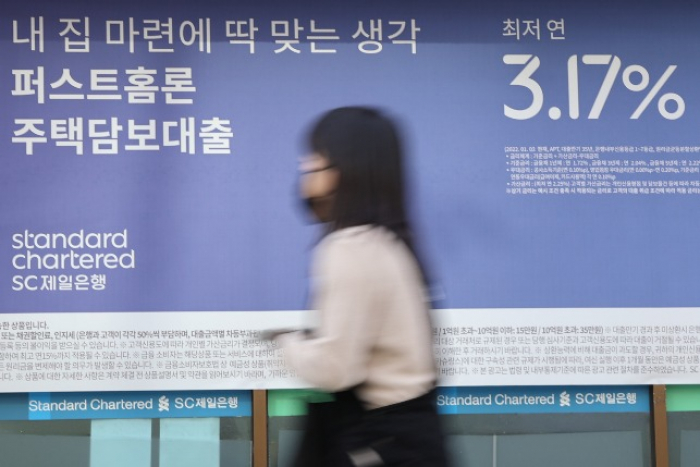Economy
S.Korea sees first decline in household loans in 20 years
A Bank of Korea report says the figure fell a record-high $5.7 billion in the fourth quarter last year
By Feb 22, 2023 (Gmt+09:00)
2
Min read
Most Read
LG Chem to sell water filter business to Glenwood PE for $692 million


Kyobo Life poised to buy Japan’s SBI Group-owned savings bank


KT&G eyes overseas M&A after rejecting activist fund's offer


StockX in merger talks with Naver’s online reseller Kream


Mirae Asset to be named Korea Post’s core real estate fund operator



Household loans in South Korea last year fell from 2021 for the first time in 20 years because of high interest rates, but credit card debt hit a record high amid "revenge consumption" caused by pent-up demand after COVID-19 restrictions were eased.
In a report on tentative data on household credit in last year's fourth quarter released on Tuesday, the Bank of Korea said household credit covering loans and credit card debt as of Dec. 31 was 1,867 trillion won ($1,429.3 billion), down 0.2% or 4.1 trillion won from the previous quarter. This was the first time that the amount fell from the previous quarter since the first quarter of 2013 saw a drop of 900 billion won.
Household loans in the fourth quarter fell a record-high 7.5 trillion won to 1,749.3 trillion won, and this was a reduction of 7.8 trillion won or 0.4% from the same quarter in 2021 and the first decline since such statistics began to be compiled in 2002. Among household loans, other loans like those of credit saw a huge drop of 736.7 trillion won.
By source, household loans from savings banks decreased by 400 billion won from the previous quarter. Non-bank deposit handling institutions such as mutual credit companies, mutual savings banks and credit unions saw a decline of 3.8 trillion won.
Household loans from other financial institutions such as insurers also fell 3.3 trillion won.
Mortgage loans reached 1,012.6 trillion won, up 4.7 trillion won from the previous quarter but from the same quarter of 2021, the amount saw its smallest increase in history of only 28.1 trillion won or 2.9%.
Household sales credit, or credit card balance before payment, reached a record high of 117.7 trillion won, up 3.4 trillion won from the previous quarter, mainly due to credit card and specialized credit companies. Revenge consumption stemming from pent-up demand following the easing of social distancing for COVID-19 and high inflation were blamed for this.
"Factors contributing to the rise in household credit include deregulation of real estate, launch of new policy-based mortgages such as the special Bogeumjari loan and easing of banks' lending attitudes," said Park Chang-hyun, head of the central bank's financial data team. "Given high interest rates and the sluggish real estate market, the potential for household credit to see rapid expansion is low."
Write to Mi-Hyun Jo at mwise@hankyung.com
More to Read
-
 Central bankBOK sees interest rate as tight amid continued drop in exports
Central bankBOK sees interest rate as tight amid continued drop in exportsFeb 21, 2023 (Gmt+09:00)
3 Min read -
 Central bankBOK mulls business, financial stability this year while focusing on inflation
Central bankBOK mulls business, financial stability this year while focusing on inflationJan 19, 2023 (Gmt+09:00)
1 Min read -
 Central bankBOK may increase rate by only 25 bps this week as won rebounds
Central bankBOK may increase rate by only 25 bps this week as won reboundsNov 21, 2022 (Gmt+09:00)
2 Min read
Comment 0
LOG IN


